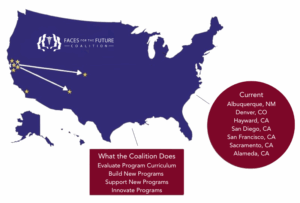
After expanding from Oakland, California to sites throughout California, in 2015 FACES for the Coalition responded to interest in both New Mexico and Colorado.
We currently run our own programming in Albuquerque, while affiliate member Denver Youth Program runs its own FACES programming in Denver and Trinidad, Colorado.
The Coalition has experience seeding programs in rural, suburban, and urban areas. We work with schools and school districts, health clinics and hospitals, and the community to build strong, engaging programs for students who will in turn flourish.
Talk to us if you are interested in building a FACES for the Future program in your community.